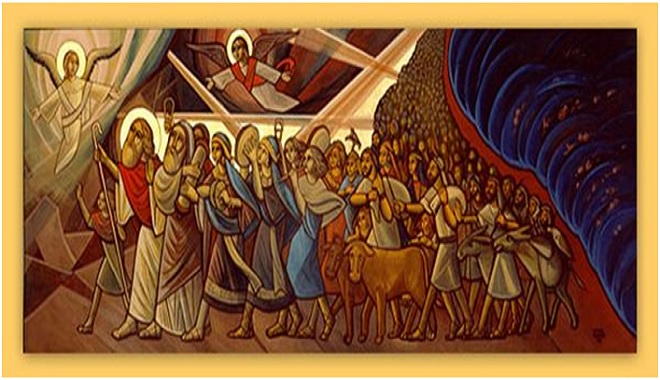The Iambic Katavasies of the Lord’s Feast of Theophany [1]
7 January 2023Ode 1
Israel passed through the storm-tossed deep of the sea
Which God had made again dry-land.
But the black waters completely covered
The commanders of the Egyptians in a watery grave
Through the mighty strength of the right hand of the Master
Interpretation:
The occasion of the crossing of the Red Sea by the people of Israel is well known and is the subject of the first ode of every katavasia. It’s always rendered in a different way and is usually adapted to the meaning of the feast to which the canon’s dedicated.

Here, though, the first ode seems not to be adapted to the meaning of the feast of Theophany and is rendered in a different, perhaps unique, manner. Let’s look at some of these features:
- ‘Israel passed through the storm-tossed deep of the sea’. This recalls Christ walking on the turbulent Sea of Tiberias against the headwind and Peter’s attempt soon afterwards, which failed because of his fear of the weather. He started to sink, but Jesus saved him. Later, when all the disciples were in the ship, the wind died down (Matth. 14, 22-31). In the first instance, the people of Israel walked across the deep of the Red Sea; in the second, Christ walked on the waves of a stormy sea. The first was a miracle and so was the second. Christ, the Lord of Hosts can order all the elements of nature to do his bidding.
- ‘Which God had made again dry-land’. Why does he say ‘again’? When had this happened before? At the creation of the world when God had said: ‘Let the water under the sky be gathered to one place, and let dry ground appear’ (Gen. 1, 9). The Maker of heaven and earth again ordered the waters to be gathered, so that dry land could appear and the Israelites would be able to cross.
- ‘But the black waters completely covered’. The black waters are the Red Sea. While the sea is, indeed, red along the shoreline, because of the red rocks which give color to the waters, it’s also black far way from the banks; it’s very deep there, the rays of the sun don’t penetrate its depths and it therefore appears to be black. Homer calls such seas ‘a fountain of black waters’ and ‘wine-dark’. For it to be black, then, the Red Sea must have been very deep, yet, despite that, Moses made the sign of the cross and opened a firm path, so that they could cross ‘with feet unwet’. ‘Completely covered’ means that the waters returned very quickly, making it impossible for the Egyptians to leave the bottom of the sea.
- ‘The commanders of the Egyptians in a watery grave’. The presence of commanders (‘tristates’= very high ranking officers) means that the Egyptian force was considerable, which, in turn, is an indication of the importance attached by the Pharoah to their return to Egypt, given that they were the main labor force of the country. ‘Watery grave’, is also unusual [since by definition a grave is dug out of solid material, not liquid (‘grave’ from Old English ‘grafan’, to dig); the word in Greek in the original, τάφος, has a similar etymology].
- ‘Through the mighty strength of the right hand of the Master’. This is a circumlocution for ‘the mighty Master’, though the expression is quite common: ‘your right hand, Lord, has been glorified in power; your right hand, Lord has shattered the enemy’ (Ex. 15, 6).
Ode 3
We have been freed from the ancient snares,
The jaws of the devouring lions have been broken.
Let us, then, rejoice greatly and open wide our mouths
Weaving from words a melody to the Word
Who delights in bestowing gifts upon us.
Interpretation:
The psalmist urges us to rejoice and to open wide our mouth in order to praise God. In the [prototype] ode 3, the Prophetess Anna says: ‘My mouth has enlarged over my enemies’ (1 Kings [i.e. 1 Sam.] 2, 1), so let us open wide our mouth to hymn God our benefactor ‘Open your mouth wide and I will fill it’ writes David (Ps. 80, 11).
One might ask: why should we express thanks and how should we do so? First, why? Because we’ve been freed from the old snares. What are these? The sin of our first ancestors, from which we’re released through baptism, the sacrament inaugurated now by Christ through his own baptism. The poet very aptly refers to the jaws of bloodthirsty lions, who are none other than ravening demons, the heads of whom the Lord destroyed in the water of the River Jordan. As David had said: ‘The Lord has crushed the molars of the lions’ (Ps. 57, 7). [The word used in Greek, to translate the original Hebrew, means ‘mill-stone’ or ‘molar’, presumably because of the notion of ‘grinding one’s teeth’!].






